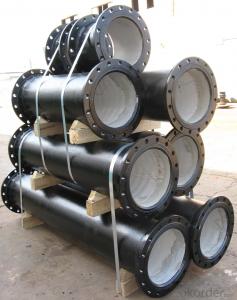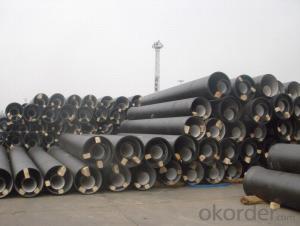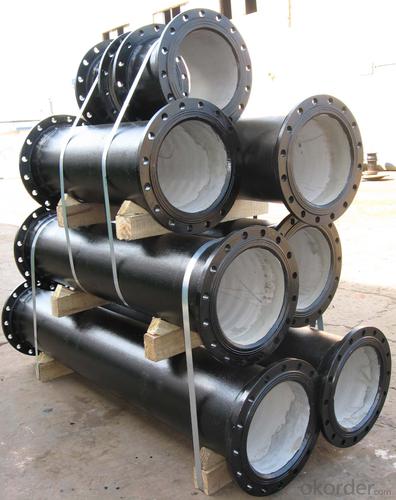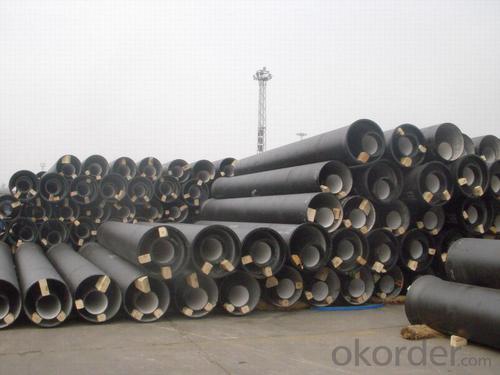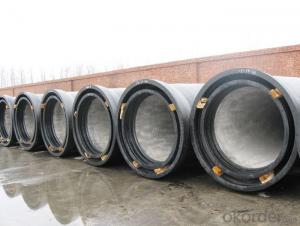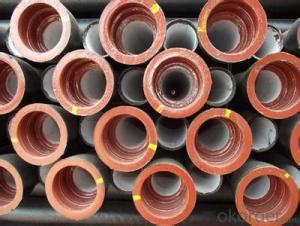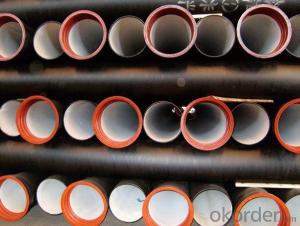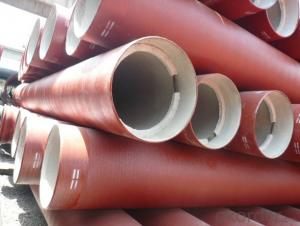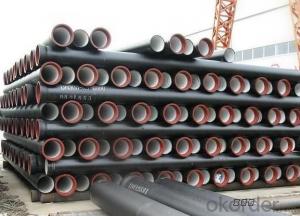Ductile Iron Pipe ISO2531EN545/EN598 C CLASS DN1400
- Loading Port:
- China main port
- Payment Terms:
- TT or LC
- Min Order Qty:
- 20 m.t.
- Supply Capability:
- 200000 m.t./month
OKorder Service Pledge
OKorder Financial Service
You Might Also Like
1.Ductile Iron Pipe Description :
1) Pipes confirm to ISO2531,K9 class,T type joint,6m long,with inside cements lining conform to ISO4179, outside Zinc
spraying(130g/m2) and bitumen coating(70μm) conform to ISO8179.
2) Pipe ends: Spigot and socket ends, with 100% SBR rubber gaskets accoding to ISO4633
3) we can do third party inspection according to customer's request.
2.Main Features of the Ductile Iron Pipe:
1).Quality guarantee
• Chemical checking
• NDE after rough machining
• Mechanical testing after heat treatment
• Final NDE,dimension inspected
2).Packing and Shipping
• standard export package(carton/wooden case/pallet)
• accept FOB,FAS,CNF,CIF door to door etc or customer designated shipping agent
3.Ductile Iron Pipe Images:
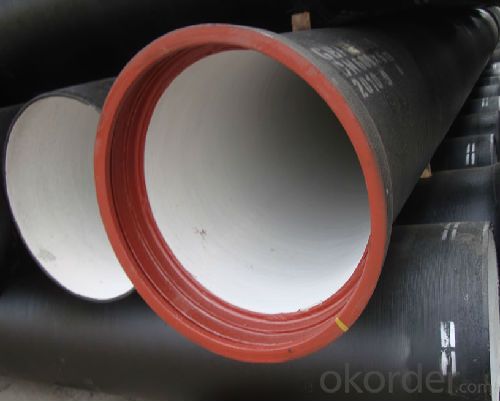
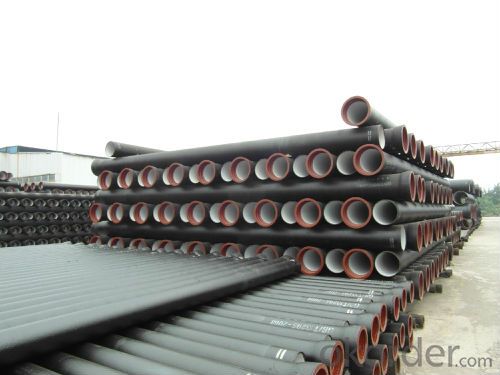
4.Ductile Iron Pipe Specification:
Surface Finishes: Bare, Oiled, Mill Varnish, Galv,FBE, FBE Dual, 3LPE, 3LPP, Coal Tar,Concrete Coating and Tape Wrap
End Finishes: Beveled, Square Cut, Threaded, hat
Additional Services: Internal Coating
Packaging: packed in bag, plastic bag, steel strip, steel wire,double wire, iron box, wooden box, tarpaulin, plastic
sheeting
Inspection: MOODY SGS BV GL DNV ABS LIOYD’S
Test: X-ray, UT, magnetic particle,inspection,hydrostatic test.
Processing service: Beveling, Threading, Slotting, Cut-to length, Bends, Quench and Temper, Fabrication, Double-jointing
and On-site assistance
5.FAQ:
We have organized several common questions for our clients,may help you sincerely:
1.Q: Why would you choose ductile iron pipe rather than other pipe materials?
A:The reasons are obvious for that not only ductile iron pipe possesses the inherent strength and flexibility of ductile
iron, combined with proven corrosion protection systems, but also the cost savings can be achieved from design to
installation and commissioning.
2.Q:Why can you guarantee the inner of pipes can’t be corroded?
A: High alumina cement mortar lining and sulphate-resistant cement mortar lining. These two special linings are applicable
to inner anti-corrosion for sewage pipes, improving resistance to erosion of the sewage components.
- Q: How are ductile iron pipes protected against mechanical damage?
- Ductile iron pipes are protected against mechanical damage through various measures that ensure their durability and longevity. One common method is the application of a protective coating on the exterior surface of the pipes. This coating acts as a barrier, shielding the ductile iron from physical abrasion, impact, and corrosion. The coating can be made of materials like epoxy, polyethylene, or zinc, depending on the specific requirements and environmental conditions. In addition to the protective coating, ductile iron pipes are also designed with a high level of structural strength. They are manufactured to withstand significant pressure and external forces, making them less susceptible to mechanical damage. The inherent strength of the material allows the pipes to resist deformation and cracking, even under heavy loads or ground movements. Furthermore, ductile iron pipes are often installed using proper bedding and backfilling techniques. This involves placing the pipes in a carefully prepared trench, ensuring a stable foundation and minimizing the risk of external forces causing damage. The correct backfill material is then used to provide support and prevent excessive pressure on the pipes. To enhance protection against mechanical damage, ductile iron pipes are often installed with additional measures such as concrete encasement or protective sleeves. Concrete encasement involves placing a layer of concrete around the pipe, providing an extra layer of protection against external forces. Protective sleeves can also be used in areas prone to impact or where additional protection is required. Regular inspections and maintenance are crucial in ensuring the continued protection of ductile iron pipes against mechanical damage. Periodic checks for any signs of wear, corrosion, or other forms of damage allow for timely repairs or replacement, preventing further deterioration. Overall, a combination of protective coatings, structural strength, proper installation techniques, and regular maintenance helps protect ductile iron pipes against mechanical damage, ensuring their reliable performance and longevity in various applications.
- Q: Are ductile iron pipes resistant to microbiologically induced corrosion?
- Yes, ductile iron pipes are generally resistant to microbiologically induced corrosion (MIC). Ductile iron is a type of cast iron that has been treated with magnesium to give it increased strength and flexibility. This treatment creates a protective layer on the surface of the iron, making it less susceptible to corrosion caused by microorganisms. MIC occurs when certain types of bacteria, fungi, or other microorganisms interact with the metal surface of pipes and produce corrosive byproducts. However, ductile iron is generally resistant to MIC because the protective layer formed during the manufacturing process acts as a barrier, preventing microorganisms from directly contacting the metal surface. Additionally, ductile iron pipes are often lined with cement mortar or other protective coatings, which further enhance their resistance to corrosion. These linings provide an additional layer of protection against microorganisms, reducing the potential for MIC. Despite these inherent resistance properties, it is important to note that the resistance to MIC can vary depending on the specific conditions and environment in which the pipes are installed. Factors such as water quality, temperature, and the presence of certain microorganisms can influence the susceptibility of ductile iron pipes to MIC. Therefore, it is essential to consider these factors and take appropriate measures to prevent MIC, such as regular monitoring of water quality, proper maintenance, and the use of corrosion inhibitors or biocides when necessary.
- Q: How is ductile iron pipe manufactured?
- Ductile iron pipe is manufactured through a process called centrifugal casting. In this process, molten iron is poured into a spinning mold, causing the iron to be distributed evenly along the inner surface of the mold. As the mold cools, the iron solidifies and forms the pipe's shape. This method ensures a strong and durable pipe with excellent tensile strength and resistance to corrosion.
- Q: How are leaks repaired in ductile iron pipe?
- Leaks in ductile iron pipe are typically repaired by cleaning and preparing the area around the leak, applying a suitable sealant or epoxy, and then securely fastening a repair clamp over the affected area. This clamp provides a tight seal and prevents any further leakage.
- Q: Ductile iron gears are generally treated without heat treatment
- Certainly. At the very least, the casting must be annealed and other heat treatment according to the requirement of use
- Q: What is ductile iron?
- Ductile iron, after being treated with either magnesium or cerium, undergoes an improvement in its mechanical properties. This particular type of cast iron earns the name "ductile" due to its higher degree of ductility in comparison to other cast iron varieties. Ductility pertains to a material's capacity to stretch or deform without breaking. This quality renders ductile iron particularly ideal for applications that demand both high strength and resistance to wear and tear, such as pipes, automotive components, and machinery parts. The inclusion of magnesium or cerium during the manufacturing process aids in the formation of graphite within the iron's structure, contributing to its distinctive properties. This graphite formation serves to enhance the iron's flexibility and reduce its brittleness, enabling it to absorb shock and vibrations without fracturing. As a whole, ductile iron presents a fine balance between the strength of cast iron and the flexibility of steel, thereby establishing itself as a versatile material well-suited for diverse industrial applications.
- Q: Can ductile iron pipe be used for wastewater treatment plant sludge dewatering?
- Yes, ductile iron pipe can be used for wastewater treatment plant sludge dewatering. Ductile iron pipes are commonly used in wastewater treatment plants due to their durability, strength, and corrosion resistance. They can handle the harsh conditions and abrasive nature of sludge dewatering processes. Ductile iron pipes are also known for their leak-proof joints, which are crucial in preventing any leakage of sludge during the dewatering process. Additionally, ductile iron pipes are available in various sizes and can be easily installed, making them a suitable choice for wastewater treatment plant sludge dewatering applications.
- Q: What are the different sizes available for ductile iron pipes?
- Ductile iron pipes are available in various sizes, typically ranging from 3 inches to 64 inches in diameter.
- Q: Are there any limitations to the length of ductile iron pipe sections?
- Limitations exist regarding the length of ductile iron pipe sections. Typically, these limitations stem from practical concerns such as transportation, installation, and handling. Longer pipe sections can present difficulties when it comes to transportation and maneuverability, particularly in areas with limited access or challenging terrain. Moreover, longer pipe sections may be more susceptible to damage during installation since proper alignment and joining can be more challenging. Manufacturing capabilities also impose limitations. Ductile iron pipes are typically produced in standard lengths, which can vary depending on the manufacturer and the specific application. These standard lengths are designed to strike a balance between transportation, installation, and overall pipe performance. In addition, longer pipe sections may pose challenges related to temperature variations and subsequent expansion and contraction. Ductile iron pipes are prone to thermal expansion and contraction, and longer sections may experience greater stress and strain as a result. Therefore, while there is no definitive maximum length for ductile iron pipe sections, practical considerations and manufacturing capabilities dictate the use of standard lengths that consider various factors such as transportation, installation, and performance.
- Q: Are ductile iron pipes suitable for use in oil refineries?
- Yes, ductile iron pipes are suitable for use in oil refineries. Ductile iron is a type of cast iron that offers a unique combination of strength, durability, and flexibility, making it an excellent choice for various applications, including oil refineries. One of the key advantages of ductile iron pipes is their high tensile strength, allowing them to withstand the high pressure and stress commonly found in oil refining processes. This strength is crucial for the transportation of various fluids, including crude oil, refined petroleum products, and chemicals within the refinery. Additionally, ductile iron pipes have excellent corrosion resistance properties, making them highly resistant to the corrosive effects of oil, chemicals, and other substances typically present in oil refineries. This corrosion resistance ensures the longevity and reliability of the pipes, reducing the need for frequent maintenance and replacement. Furthermore, ductile iron pipes have exceptional ductility, which means they can absorb and withstand significant impacts and vibrations without fracturing or breaking. This quality is advantageous in oil refineries where there may be frequent movement or potential stressors due to machinery, equipment, or ground settlement. Moreover, ductile iron pipes have a smooth interior surface that reduces friction, allowing for efficient fluid flow and minimizing pressure loss. This characteristic is essential in oil refineries, as it helps optimize the transportation of fluids, ensuring a smooth and reliable production process. In conclusion, ductile iron pipes are suitable for use in oil refineries due to their high tensile strength, corrosion resistance, ductility, and smooth interior surface. These pipes provide a reliable and durable solution for transporting various fluids within the refinery, contributing to the efficient and safe operation of oil refining processes.
Send your message to us
Ductile Iron Pipe ISO2531EN545/EN598 C CLASS DN1400
- Loading Port:
- China main port
- Payment Terms:
- TT or LC
- Min Order Qty:
- 20 m.t.
- Supply Capability:
- 200000 m.t./month
OKorder Service Pledge
OKorder Financial Service
Similar products
Hot products
Hot Searches
Related keywords
